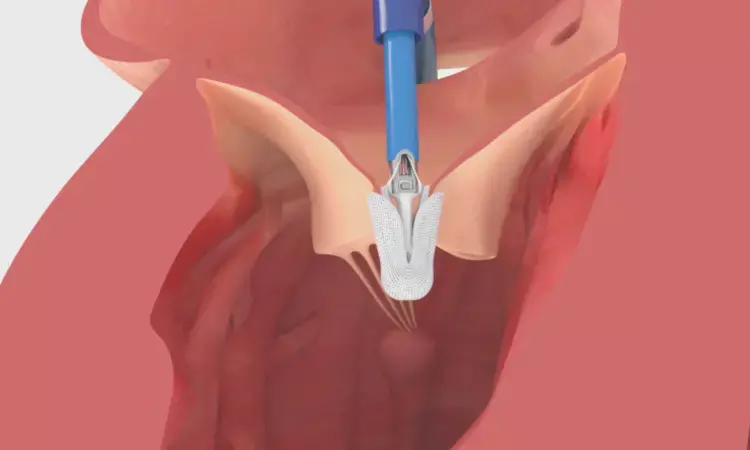- Home
- Medical news & Guidelines
- Anesthesiology
- Cardiology and CTVS
- Critical Care
- Dentistry
- Dermatology
- Diabetes and Endocrinology
- ENT
- Gastroenterology
- Medicine
- Nephrology
- Neurology
- Obstretics-Gynaecology
- Oncology
- Ophthalmology
- Orthopaedics
- Pediatrics-Neonatology
- Psychiatry
- Pulmonology
- Radiology
- Surgery
- Urology
- Laboratory Medicine
- Diet
- Nursing
- Paramedical
- Physiotherapy
- Health news
- Fact Check
- Bone Health Fact Check
- Brain Health Fact Check
- Cancer Related Fact Check
- Child Care Fact Check
- Dental and oral health fact check
- Diabetes and metabolic health fact check
- Diet and Nutrition Fact Check
- Eye and ENT Care Fact Check
- Fitness fact check
- Gut health fact check
- Heart health fact check
- Kidney health fact check
- Medical education fact check
- Men's health fact check
- Respiratory fact check
- Skin and hair care fact check
- Vaccine and Immunization fact check
- Women's health fact check
- AYUSH
- State News
- Andaman and Nicobar Islands
- Andhra Pradesh
- Arunachal Pradesh
- Assam
- Bihar
- Chandigarh
- Chattisgarh
- Dadra and Nagar Haveli
- Daman and Diu
- Delhi
- Goa
- Gujarat
- Haryana
- Himachal Pradesh
- Jammu & Kashmir
- Jharkhand
- Karnataka
- Kerala
- Ladakh
- Lakshadweep
- Madhya Pradesh
- Maharashtra
- Manipur
- Meghalaya
- Mizoram
- Nagaland
- Odisha
- Puducherry
- Punjab
- Rajasthan
- Sikkim
- Tamil Nadu
- Telangana
- Tripura
- Uttar Pradesh
- Uttrakhand
- West Bengal
- Medical Education
- Industry
TriClip Proven Safe and Effective in Reducing Tricuspid Regurgitation: TCT 2025

A recent study has demonstrated that the TriClipTM transcatheter tricuspid repair system (Abbott) substantially lowered the severity of tricuspid regurgitation (TR) and quality of life in patients with high surgical risk. Introduced as a Late-Breaking Clinical Trial at TCT 2025, the ultimate findings of the TRILUMINATE Pivotal Trial reaffirmed that TriClip is both safe and effective, and demonstrates quantifiable improvements in symptoms, functional status, and procedural results within only 30 days following procedure. This finding represents an important advancement in the treatment of right-sided valvular heart disease, which heretofore has had no minimally invasive treatment alternatives.
Tricuspid regurgitation in more than 1.6 million individuals in the United States leads to progressive right-heart dilation and failure when untreated. Comorbidities and high procedural risks make many patients noncandidates for surgery. The TriClip system, based on the established MitraClip platform, provides a percutaneous approach that corrects leaflet coaptation to minimize backward flow of blood, creating a new avenue for therapy for those classified as inoperable.
The TRILUMINATE Pivotal Trial was a randomized controlled, multicenter, prospective trial that compared TriClip T-TEER (transcatheter edge-to-edge repair) with or without guideline-directed medical therapy (GDMT) to GDMT alone in patients with symptomatic severe TR. Patients who were eligible were considered to be at prohibitive surgical risk by a multidisciplinary heart team. The main endpoints of the study were freedom from all-cause mortality or tricuspid valve surgery at 12 months, percent reduction of patients to ≤ moderate TR, and change in Kansas City Cardiomyopathy Questionnaire (KCCQ) score at 30 days. The secondary endpoints evaluated procedural safety, major adverse events (MAEs), hospitalization for heart failure, and right-heart echocardiographic parameters.
Key Findings
The last TCT 2025 analysis showed strong clinical and procedural advantages in all study areas:
Significant Quality-of-Life Improvement:
TriClip repair patients had a major increase in KCCQ scores at 30 days, indicating improved daily function and decreased symptom burden. Most reported increased energy levels and exercise capacity versus baseline.
Superior Safety Profile:
Low mortality rates, hospitalizations for heart failure, bleeding, conduction problems, and device thrombosis were seen at 30 days. Major adverse events incidence continued to be one of the lowest in the transcatheter valve procedures, reinforcing TriClip's excellent procedural safety.
Predictable Efficacy in CIED Patients:
The system was found to be safe and efficacious in patients with CIED leads, yielding comparable TR reductions and success rates with non-CIED patients. This observation expands the therapy to a subgroup that is usually considered technically demanding.
Efficiency Gains with Operator Experience
Procedure and device times reduced dramatically with operator experience, revealing a well-defined learning curve and enhanced workflow efficiency. Mean procedure time and fluoroscopy exposure were minimized in comparison to previous feasibility results.
The TRILUMINATE results concur with the previous studies like TRI-FR and CLASP TR, reinforcing that transcatheter tricuspid interventions are not only feasible but also durable. Long-term collection of data remains to continue evaluating durability more than 12 months, right-heart remodeling, and long-term functional outcomes.
The definitive TRILUMINATE Pivotal Trial outcomes establish the TriClip edge-to-edge transcatheter repair system as an effective and safe treatment for symptomatic severe tricuspid regurgitation. With robust improvements in patient-reported outcomes, low procedural risk, and uniform success across subgroups, TriClip sets a new standard for percutaneous right-sided valve disease management.
Reference:
Kar, S., Makkar, R. R., Whisenant, B. K., et al. (2025). Two-year outcomes of transcatheter edge-to-edge repair for severe tricuspid regurgitation: The TRILUMINATE pivotal randomized trial. Circulation. Advance online publication. https://doi.org/10.1161/CIRCULATIONAHA.125.074536
Dr Riya Dave has completed dentistry from Gujarat University in 2022. She is a dentist and accomplished medical and scientific writer known for her commitment to bridging the gap between clinical expertise and accessible healthcare information. She has been actively involved in writing blogs related to health and wellness.
Dr Kamal Kant Kohli-MBBS, DTCD- a chest specialist with more than 30 years of practice and a flair for writing clinical articles, Dr Kamal Kant Kohli joined Medical Dialogues as a Chief Editor of Medical News. Besides writing articles, as an editor, he proofreads and verifies all the medical content published on Medical Dialogues including those coming from journals, studies,medical conferences,guidelines etc. Email: drkohli@medicaldialogues.in. Contact no. 011-43720751


